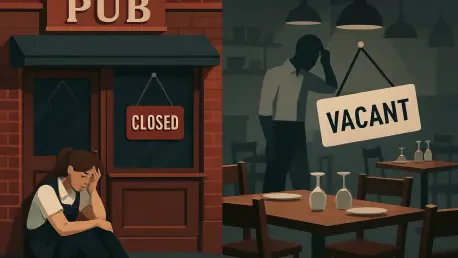The UK hospitality sector, a cornerstone of local economies and community life, finds itself grappling with an unprecedented financial crisis that threatens its very survival. Recent data from a comprehensive survey by prominent trade organizations, including the British Institute of Innkeeping, the British Beer & Pub Association, UKHospitality, and Hospitality Ulster, paints a grim picture of an industry battered by soaring costs and punitive tax hikes. A staggering 69% of businesses are operating at or below 85% of their necessary capacity, forced into tough decisions like workforce reductions and price increases just to keep their doors open. This alarming trend not only jeopardizes the livelihoods of thousands but also risks eroding the social fabric that pubs, restaurants, and hotels help weave across communities. The mounting pressures have left the sector in a precarious position, with many establishments teetering on the edge of collapse as they navigate an increasingly hostile economic landscape. How did this vital industry reach such a critical juncture, and what factors are driving this downward spiral?
Economic Pressures and Operational Challenges
Delving deeper into the crisis, the financial strain on hospitality businesses stems largely from a combination of rising operational costs and recent tax increases that have hit the sector hard. Survey results reveal that 73% of these establishments have less than six months of cash reserves, with one in five having no reserves at all, leaving them vulnerable to even the slightest economic shock. Since April, 79% of businesses have been compelled to raise prices to offset expenses, while over half have had to cut staff numbers to stay afloat. This has resulted in a reported loss of 84,000 jobs following the latest Budget, which imposed an additional annual cost burden of £3.4 billion on the industry. These figures highlight a sector forced into a corner, making impossible choices between maintaining service quality and ensuring financial survival. The ripple effects are felt not just by business owners but also by employees and customers who bear the brunt of reduced hours, diminished services, and higher costs at their local venues.
A Call for Government Intervention
Looking ahead, the consensus among industry leaders and trade bodies is that urgent government action is essential to prevent further deterioration of the hospitality sector. There is a unified push for specific policy changes, including a reduction in VAT, revisions to the employer National Insurance Contributions adjustments made earlier this year, and a decrease in business rates. These measures are seen as critical lifelines to curb additional job losses, prevent further price hikes, and stabilize operating hours that have already been slashed. The joint statement from trade organizations emphasized that hospitality plays a pivotal role in supporting employment, particularly for young people, and fostering community cohesion. Without swift intervention, the sector’s ability to contribute to local economies hangs in the balance. Reflecting on past struggles, the industry has demonstrated resilience, but the scale of current challenges necessitates bold steps. Moving forward, stakeholders hope the upcoming Budget will address these pressing needs, offering a pathway to recovery and renewed growth for a sector integral to British life.









